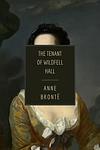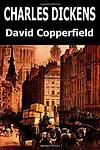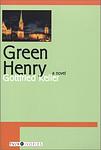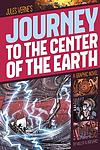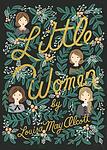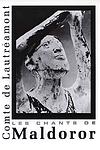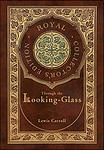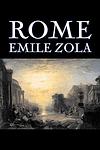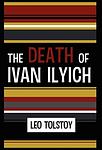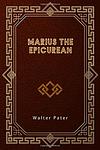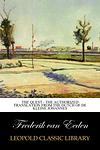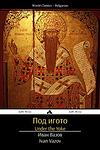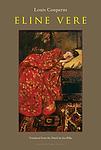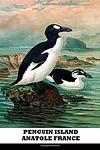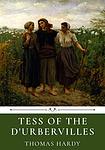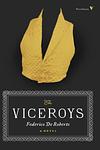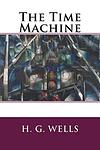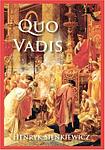1001 Books You Must Read Before You Die
This is one of the 300 lists we use to generate our main The Greatest Books list.
-
Jane Eyre by Charlotte Bronte
The novel follows the life of Jane Eyre, an orphan who is mistreated by her relatives and sent to a charity school. As she grows up, Jane becomes a governess at Thornfield Hall, where she falls in love with the brooding and mysterious Mr. Rochester. However, she soon learns of a dark secret in his past that threatens their future together. The story is a profound exploration of a woman's self-discovery and her struggle for independence and love in a rigid Victorian society.
The 20th Greatest Book of All Time -
Vanity Fair by William Makepeace Thackeray
This classic novel follows the lives of two contrasting women, the cunning and ruthless Becky Sharp and the sweet and naive Amelia Sedley, against the backdrop of English society during the Napoleonic Wars. The book is a satirical exploration of the obsession with wealth, status, and social climbing, and the moral bankruptcy that can result from such pursuits. The narrative weaves an intricate tale of love, betrayal, and redemption, exposing the vanity and hypocrisy of high society.
The 72nd Greatest Book of All Time -
Wuthering Heights by Emily Brontë
This classic novel is a tale of love, revenge and social class set in the Yorkshire moors. It revolves around the intense, complex relationship between Catherine Earnshaw and Heathcliff, an orphan adopted by Catherine's father. Despite their deep affection for each other, Catherine marries Edgar Linton, a wealthy neighbor, leading Heathcliff to seek revenge on the two families. The story unfolds over two generations, reflecting the consequences of their choices and the destructive power of obsessive love.
The 11th Greatest Book of All Time -
The Tenant of Wildfell Hall by Anne Brontë
"The Tenant of Wildfell Hall" is a novel about a mysterious woman who moves into the dilapidated Wildfell Hall with her young son. As the story unfolds, it is revealed that she is running from an abusive, alcoholic husband and has taken on a new identity to protect her child. The narrative explores themes of gender roles, morality, and the societal constraints of the Victorian age, as well as the consequences of alcoholism and debauchery.
The 826th Greatest Book of All Time -
David Copperfield by Charles Dickens
This novel follows the life of its titular protagonist from his childhood to maturity. Born to a young widow, David endures a difficult childhood when his mother remarries a harsh and abusive man. After his mother's death, he is sent to a boarding school before being forced into child labor. As he grows, David experiences hardship, love, and loss, all the while meeting a colorful array of characters. The novel is a journey of self-discovery and personal growth, showcasing the harsh realities of 19th-century England.
The 45th Greatest Book of All Time -
The Scarlet Letter by Nathaniel Hawthorne
Set in 17th-century Puritan Boston, this novel tells the story of a woman who conceives a daughter through an affair and struggles to create a new life of repentance and dignity. She is forced to wear a scarlet "A" on her dress as a sign of her adultery while her lover, a revered local minister, remains unnamed and unpunished. Throughout the book, themes of sin, legalism, and guilt are explored.
The 58th Greatest Book of All Time -
Moby Dick by Herman Melville
The novel is a detailed narrative of a vengeful sea captain's obsessive quest to hunt down a giant white sperm whale that bit off his leg. The captain's relentless pursuit, despite the warnings and concerns of his crew, leads them on a dangerous journey across the seas. The story is a complex exploration of good and evil, obsession, and the nature of reality, filled with rich descriptions of whaling and the sea.
The 9th Greatest Book of All Time -
The House of the Seven Gables by Nathaniel Hawthorne
This novel revolves around the cursed Pyncheon family, who live in a gloomy New England mansion, cursed due to the actions of their ancestor who had an innocent man hanged as a witch to seize his property. The story explores themes of guilt, retribution, and atonement, and the narrative is interspersed with the author's philosophical musings. The present-day Pyncheons include an old maid, a daguerreotypist, and their elderly, reclusive cousin who returns to the house after a mysterious absence of many years.
The 486th Greatest Book of All Time -
Uncle Tom's Cabin by Harriet Beecher Stowe
This renowned novel provides a harsh critique of American slavery through the story of Uncle Tom, a long-suffering black slave. The narrative follows Tom as he is sold and transported to the harsh South, encountering a variety of characters, both kind and cruel. The novel powerfully explores themes of faith, the immorality of slavery, and the concept of humanity, ultimately contributing to the abolitionist cause and leaving a significant impact on the American perception of slavery.
The 173rd Greatest Book of All Time -
Cranford by Elizabeth Gaskell
"Cranford" is a novel that explores the lives and social dynamics of a group of women in a small, fictional English town. The narrative is episodic, focusing on the women's everyday experiences, their relationships, and the societal changes they face. The story is characterized by its humor, warmth, and keen observations of human nature, offering a compassionate and insightful portrayal of life in a small community during the Victorian era.
The 691st Greatest Book of All Time -
Bleak House by Charles Dickens
"Bleak House" is a complex narrative that critiques the British judiciary system through a long-running legal case known as Jarndyce and Jarndyce. The story follows the lives of numerous characters, including the kind-hearted Esther Summerson, her friends Richard and Ada, and their guardian, Mr. Jarndyce, who are all caught in the web of a legal dispute over an inheritance. The novel is known for its detailed depiction of the legal system, its vivid characters, and its exploration of social issues of the time.
The 161st Greatest Book of All Time -
Walden by Henry David Thoreau
This work is a reflection upon simple living in natural surroundings, inspired by the author's two-year experience of living in a cabin near a woodland pond. Filled with philosophical insights, observations on nature, and declarations of independence from societal expectations, the book is a critique of the complexities of modern civilization and a call to appreciate the beauty and simplicity of the natural world. It explores themes such as self-reliance, solitude, and the individual's relationship with nature.
The 71st Greatest Book of All Time -
Green Henry by Gottfried Keller
"Green Henry" is a semi-autobiographical novel that chronicles the life of a young man who dreams of becoming a painter but faces countless obstacles on his journey. The protagonist leaves his Swiss village and travels to Munich to study art, but his lack of discipline and financial difficulties force him to return home. After his mother's death, he begins to reassess his life and eventually finds his place in society. The novel explores themes of identity, ambition, and the struggle between individual desires and societal expectations.
The 803rd Greatest Book of All Time -
North and South by Elizabeth Gaskell
This novel presents a story of a young woman who moves from the rural south of England to a northern industrial town, where she experiences a dramatic culture shock. The narrative explores the stark contrasts between the lifestyles, attitudes, and social expectations in the two regions, as well as the protagonist's struggle to fit in and understand her new environment. The book also addresses the harsh realities of the industrial revolution, including labor disputes and class conflicts, while weaving in a compelling love story.
The 1041st Greatest Book of All Time -
Madame Bovary by Gustave Flaubert
Madame Bovary is a tragic novel about a young woman, Emma Bovary, who is married to a dull, but kind-hearted doctor. Dissatisfied with her life, she embarks on a series of extramarital affairs and indulges in a luxurious lifestyle in an attempt to escape the banalities and emptiness of provincial life. Her desire for passion and excitement leads her down a path of financial ruin and despair, ultimately resulting in a tragic end.
The 19th Greatest Book of All Time -
Indian Summer by Adalbert Stifter
"Indian Summer" is a romantic novel set in the 19th century that narrates the story of a young man who falls in love with a woman, only to discover that she is his biological sister. The novel is a detailed exploration of the protagonist's emotional turmoil as he grapples with his feelings. The story also delves into the themes of nature, beauty, and art, with vivid descriptions of landscapes and the changing seasons. The narrative is a blend of realism and poetic symbolism, reflecting the author's philosophical insights into the human condition.
The 1975th Greatest Book of All Time -
Adam Bede by George Eliot
"Adam Bede" is a 19th-century novel set in rural England that explores the themes of love, betrayal, and moral responsibility. The story revolves around a hardworking carpenter, Adam Bede, who is in love with a vain but beautiful dairymaid, Hetty Sorrel. However, Hetty is seduced by a young, thoughtless squire, Arthur Donnithorne, which leads to her becoming pregnant. When Arthur abandons her, Hetty leaves her baby in the woods, where it dies, and she is subsequently charged with infanticide. Adam, devastated by Hetty's actions, finds solace and eventually love with a devout Methodist preacher, Dinah Morris. The novel ends with Adam and Dinah marrying, finding happiness after the tragedy.
The 470th Greatest Book of All Time -
Oblomov by Ivan Goncharov
The book is a satirical critique of the nobility in 19th century Russia, focusing on the titular character, a lazy and apathetic nobleman who prefers to daydream and live in his own fantasies rather than engage with the real world. His indolence is contrasted with the energetic and ambitious character of his friend who tries to get him involved in societal affairs and business. The protagonist's lethargy and inability to adapt to changing times symbolize the decay and stagnation of the Russian nobility.
The 282nd Greatest Book of All Time -
The Woman in White by Wilkie Collins
A captivating tale of mystery and suspense, "The Woman in White" follows the story of a young art teacher, Walter Hartright, who encounters a mysterious woman dressed in white on a moonlit road. The woman is revealed to be a mental asylum escapee, and as Hartright delves into her story, he uncovers a web of deceit, madness, and dangerous secrets involving a wealthy, titled family. The narrative explores themes of identity, insanity, and the abuse of power, with a complex plot filled with twists and turns.
The 162nd Greatest Book of All Time -
The Mill on the Floss by George Eliot
"The Mill on the Floss" is a novel that explores the lives of siblings Tom and Maggie Tulliver, who grow up at Dorlcote Mill on the River Floss. The book delves into their experiences in the rural society of the time, their complex relationship, and the choices they make in adulthood. The story is marked by themes of love, betrayal, societal expectations, and the struggle between individual desires and family obligations. The tragic ending underscores the consequences of societal norms and the struggle against them.
The 332nd Greatest Book of All Time -
Max Havelaar by Multatuli
"Max Havelaar" is a novel centered around a Dutch civil servant who is stationed in the Dutch East Indies (now Indonesia) during the mid-19th century. The protagonist, trying to battle the corruption and exploitation of the local people by Dutch colonial rulers, becomes disillusioned with the system. The novel provides a scathing critique of the colonial regime's treatment of the indigenous people, highlighting their suffering and exploitation. The author uses various narrative techniques and perspectives, making it a significant work in Dutch literature.
The 2435th Greatest Book of All Time -
Great Expectations by Charles Dickens
A young orphan boy, living with his cruel older sister and her kind blacksmith husband, has an encounter with an escaped convict that changes his life. Later, he becomes the protégé of a wealthy but reclusive woman and falls in love with her adopted daughter. He then learns that an anonymous benefactor has left him a fortune, leading him to believe that his benefactor is the reclusive woman and that she intends for him to marry her adopted daughter. He moves to London to become a gentleman, but his great expectations are ultimately shattered when he learns the true identity of his benefactor and the reality of his love interest.
The 33rd Greatest Book of All Time -
Silas Marner by George Eliot
Silas Marner, a weaver, is wrongfully accused of theft and excommunicated from his community in Lantern Yard. He moves to the village of Raveloe, where he lives as a recluse, hoarding his money. After his money is stolen, he adopts a young girl named Eppie, who was abandoned near his home. Eppie's presence transforms Silas's life, and he becomes a cherished member of the community. The novel explores themes of betrayal, redemption, and the transformative power of love.
The 406th Greatest Book of All Time -
Fathers and Sons by Ivan Turgenev
This classic novel explores the generational divide and ideological clash in 19th century Russia. The story focuses on the relationship between a liberal father and his nihilistic son, who challenges the traditional values and beliefs of his elders. As they navigate their personal differences, the novel delves into broader themes of progress, love, and societal change, offering a poignant commentary on the tension between old and new ideas in a rapidly changing world.
The 132nd Greatest Book of All Time -
Les Misérables by Victor Hugo
Set in early 19th-century France, the narrative follows the lives and interactions of several characters, particularly the struggles of ex-convict Jean Valjean and his journey towards redemption. The story touches upon the nature of law and grace, and elaborates upon the history of France, architecture of Paris, politics, moral philosophy, antimonarchism, justice, religion, and the types and nature of romantic and familial love. It is known for its vivid and relatable characters, and its exploration of societal and moral issues.
The 46th Greatest Book of All Time -
The Water-Babies, A Fairy Tale for a Land Baby by Charles Kingsley
"The Water-Babies, A Fairy Tale for a Land Baby" is a children's novel that tells the story of a young chimney sweep named Tom who falls into a river and transforms into a 'water-baby'. He embarks on a series of underwater adventures, meeting various creatures and learning important moral lessons. The book uses fantasy and satire to explore themes of child labor, social reform, and the natural sciences.
The 2435th Greatest Book of All Time -
Notes from the Underground by Fyodor Dostoevsky
This novel is a profound exploration of the human psyche through the eyes of a bitter and isolated retired civil servant living in St. Petersburg. The protagonist, a self-proclaimed "sick" and "spiteful" man, delves into his past experiences and personal philosophies in a series of rambling and often contradictory monologues. His existential musings touch on themes such as free will, determinism, and the nature of human action, often challenging the prevailing ideologies of his time. The narrative provides a deep and unsettling insight into the darker aspects of human consciousness.
The 421st Greatest Book of All Time -
Uncle Silas by Sheridan Le Fanu
"Uncle Silas" is a classic Gothic novel set in Victorian England that follows the story of a young, naive heiress who is left in the care of her mysterious and seemingly sinister Uncle Silas after her father's death. As she navigates her new life in his decrepit mansion, she uncovers dark family secrets, and begins to suspect her uncle may have ulterior motives. The novel explores themes of innocence, corruption, and the nature of evil, all set against the backdrop of a suspenseful and eerie atmosphere.
The 889th Greatest Book of All Time -
Alice's Adventures in Wonderland by Lewis Carroll
This novel follows the story of a young girl named Alice who falls down a rabbit hole into a fantastical world full of peculiar creatures and bizarre experiences. As she navigates through this strange land, she encounters a series of nonsensical events, including a tea party with a Mad Hatter, a pool of tears, and a trial over stolen tarts. The book is renowned for its playful use of language, logic, and its exploration of the boundaries of reality.
The 22nd Greatest Book of All Time -
Journey to the Center of the Earth by Jules Verne
This science fiction novel revolves around a German professor who believes there are volcanic tubes leading to the center of the Earth. He, his nephew, and their guide embark on an adventurous expedition down an Icelandic volcano into the Earth's core. They encounter prehistoric animals, natural disasters, and otherworldly phenomena along their journey. The expedition is both thrilling and dangerous, testing the limits of their courage and survival skills.
The 589th Greatest Book of All Time -
Crime and Punishment by Fyodor Dostoevsky
A young, impoverished former student in Saint Petersburg, Russia, formulates a plan to kill an unscrupulous pawnbroker to redistribute her wealth among the needy. However, after carrying out the act, he is consumed by guilt and paranoia, leading to a psychological battle within himself. As he grapples with his actions, he also navigates complex relationships with a variety of characters, including a virtuous prostitute, his sister, and a relentless detective. The narrative explores themes of morality, redemption, and the psychological impacts of crime.
The 13th Greatest Book of All Time -
The Last Chronicle of Barset by Anthony Trollope
The novel is the final installment in a series set in the fictional English county of Barsetshire, focusing on a clergyman accused of stealing a cheque, a crime he did not commit. The story explores the scandal's impact on his family and the community, his struggle to maintain his innocence, and the efforts of a local archdeacon to clear his name. The narrative also intertwines several romantic subplots, including the courtship of the clergyman's daughter by a man of higher social status.
The 859th Greatest Book of All Time -
Thérèse Raquin by Émile Zola
"Thérèse Raquin" is a novel about a young woman who is unhappily married to her cousin, a sickly and selfish man. She embarks on a passionate and destructive affair with one of her husband's friends, leading to a series of tragic events. The novel explores themes of lust, guilt, and the psychological consequences of such immoral actions, set against the bleak backdrop of the Parisian underworld.
The 681st Greatest Book of All Time -
The Moonstone by Wilkie Collins
"The Moonstone" is a detective novel that revolves around a large, valuable yellow diamond that was stolen from an Indian temple and is now in England. The diamond is bequeathed to a young woman on her eighteenth birthday, but is stolen that same night. The novel follows the investigation of the theft, which is complicated by a series of confusing events and false leads. The resolution involves the unraveling of a tangled web of deception, crime, and colonial guilt.
The 295th Greatest Book of All Time -
Little Women by Louisa May Alcott
This classic novel follows the lives of the four March sisters - Meg, Jo, Beth, and Amy - as they navigate the challenges and joys of adolescence and adulthood in 19th century New England. As they grow, they grapple with issues of poverty, gender roles, love, and personal identity, each in her own unique way. The story is a testament to the power of family, sisterhood, and female resilience in a time of societal constraints.
The 65th Greatest Book of All Time -
The Idiot by Fyodor Dostoevsky
The book follows the story of a kind-hearted and naive protagonist who returns to Russia from a Swiss sanatorium, where he was treated for a severe epileptic condition. Despite his pure intentions, he gets entangled in a web of love, greed, and manipulation, leading to tragic consequences. The novel explores themes of innocence, love, sacrifice, and societal expectations, offering a profound critique of Russian society during the 19th century.
The 108th Greatest Book of All Time -
Maldoror (Les Chants de Maldoror) by Comte de Lautréamont
"Maldoror (Les Chants de Maldoror)" is a poetic novel that explores the dark and surreal world of the protagonist, Maldoror, a figure of absolute evil who rejects God and conventional morality, often expressing a violent hatred towards humanity. The book is composed of six cantos filled with bizarre and often shocking imagery, which depict Maldoror's experiences in a world that he perceives as chaotic and indifferent. The novel is known for its vivid and often disturbing exploration of the human condition and its subversion of traditional literary norms.
The 868th Greatest Book of All Time -
Phineas Finn by Anthony Trollope
"Phineas Finn" is a novel about a young Irishman who moves to London to become a politician. Despite his lack of experience, he quickly rises in the ranks due to his charm and charisma. However, he struggles to balance his political career with his personal life, particularly his romantic relationships with several women. As he navigates the complex world of politics, he must also grapple with moral dilemmas and the consequences of his actions.
The 1975th Greatest Book of All Time -
A Sentimental Education by Gustave Flaubert
A Sentimental Education is a classic French novel set in the mid-19th century, focusing on the life of a young man named Frederic Moreau. Frederic, from a provincial background, moves to Paris and becomes infatuated with an older woman, Madame Arnoux. The novel traces Frederic's life and romantic pursuits, as well as his friendships and experiences in Paris, against the backdrop of significant historical events like the 1848 Revolution. The story is a critique of the French middle class and their materialistic values, illustrating the disillusionment and moral corruption of the time.
The 262nd Greatest Book of All Time -
War and Peace by Leo Tolstoy
Set in the backdrop of the Napoleonic era, the novel presents a panorama of Russian society and its descent into the chaos of war. It follows the interconnected lives of five aristocratic families, their struggles, romances, and personal journeys through the tumultuous period of history. The narrative explores themes of love, war, and the meaning of life, as it weaves together historical events with the personal stories of its characters.
The 16th Greatest Book of All Time -
King Lear of the Steppes by Ivan Turgenev
"King Lear of the Steppes" is a tragic novella about a wealthy landowner who, in his old age, decides to divide his property among his two daughters. The daughters, once kind and loving, turn on their father once they gain control of his estate, leaving him destitute and alone. In his despair, the landowner becomes a vagabond, wandering the very lands he once owned. The story explores themes of family, betrayal, and the tragic consequences of greed.
The 2435th Greatest Book of All Time -
Through the Looking Glass by Lewis Carroll
This sequel to Alice's Adventures in Wonderland sees the young protagonist, Alice, embarking on another whimsical journey after stepping through a looking glass. In this mirror-image world, Alice encounters talking flowers, living chess pieces, and a variety of eccentric characters, including Tweedledee and Tweedledum, the Red Queen, and Humpty Dumpty. The narrative is structured around a game of chess, with Alice striving to become a queen. The book is filled with clever wordplay, riddles, and fantastical elements, reflecting the author's unique take on logic and language.
The 401st Greatest Book of All Time -
Middlemarch by George Eliot
Set in the fictitious English town of Middlemarch during the early 19th century, the novel explores the complex web of relationships in a close-knit society. It follows the lives of several characters, primarily Dorothea Brooke, a young woman of idealistic fervor, and Tertius Lydgate, an ambitious young doctor, who both grapple with societal expectations, personal desires, and moral dilemmas. Their stories intertwine with a rich tapestry of other townsfolk, reflecting themes of love, marriage, ambition, and reform, making a profound commentary on the human condition.
The 23rd Greatest Book of All Time -
Torrents of Spring by Ivan Turgenev
"Torrents of Spring" is a poignant narrative that follows the life of a young Russian nobleman who, after falling in love with a beautiful but unattainable princess, marries a peasant girl. However, he soon falls out of love with his wife and becomes infatuated with a sophisticated married woman. The story explores themes of unrequited love, societal norms, and the complexities of human relationships, providing a deep reflection on the nature of love and the impact of societal expectations.
The 2435th Greatest Book of All Time -
Erewhon by Samuel Butler
"Erewhon" is a satirical novel set in a fictional country discovered by the protagonist during his exploration. The society in this country is unusual, where illness is considered a crime, crime is treated as a disease, and machines are feared for their potential to evolve and overtake humanity. The book uses this bizarre world to critique various aspects of Victorian society, including religion, morality, and the industrial revolution.
The 1319th Greatest Book of All Time -
Demons by Fyodor Dostoevsky
"The Possessed" is a complex political novel set in a provincial Russian town, exploring the destructive influence of radical ideologies on society. The narrative revolves around a group of revolutionaries, their philosophical debates and their destructive actions, driven by nihilism and anarchism. The story is a critique of the political and social chaos of the time, showcasing the author's deep understanding of human psychology and his profound insights into the human condition. It is an exploration of faith, reason, and the nature of freedom and is considered one of the most significant works of Russian literature.
The 144th Greatest Book of All Time -
In a Glass Darkly by Sheridan Le Fanu
"In a Glass Darkly" is a collection of five short stories in the horror and mystery genres, all presented as cases of a fictional physician whose researches lead him into the dark corners of the supernatural. The tales involve a range of eerie and macabre happenings such as a man being haunted by his doppelgänger, a cursed mirror, a deadly spectral wolf, a case of spontaneous combustion, and the iconic story of a woman being preyed upon by a female vampire. The stories are tied together by the posthumous papers of the occult detective Dr. Martin Hesselius.
The 2435th Greatest Book of All Time -
Around the World in Eighty Days by Jules Verne
The novel follows the journey of a wealthy Englishman who makes a high-stakes wager that he can travel around the world in eighty days. Accompanied by his loyal French valet, they encounter numerous obstacles and adventures across different cultures and landscapes, including rescuing a beautiful Indian woman from a ritual sacrifice. The book is a celebration of the technological advancements of the 19th century, with the main characters utilizing various modes of transportation such as steamships, railways, and even an elephant.
The 943rd Greatest Book of All Time -
The Enchanted Wanderer by Nikolai Leskov
"The Enchanted Wanderer" is a collection of short stories that follow the life of a Russian serf, Ivan Flyagin, who is destined to wander forever and never die. Throughout his travels, he experiences a myriad of adventures including becoming a monk, being captured by Tartars, and falling in love. The stories are filled with folkloric elements and offer a vivid depiction of 19th-century Russian society.
The 1512th Greatest Book of All Time -
Far from the Madding Crowd by Thomas Hardy
Set in rural England, the novel follows the story of Bathsheba Everdene, a young and independent woman who inherits her uncle's farm. She becomes the object of affection for three very different men: Gabriel Oak, a sheep farmer; Sergeant Frank Troy, a reckless soldier; and William Boldwood, a prosperous and mature bachelor. The narrative explores love, honor, and betrayal against a backdrop of the changing social and economic landscape of 19th century England.
The 431st Greatest Book of All Time -
Pepita Jimenez by Juan Valera y Alcalá-Galiano
"Pepita Jimenez" is a romantic Spanish novel that tells the story of a young widow named Pepita and her love affair with Luis, a seminary student destined for priesthood. The story unfolds in a small Spanish town and explores the themes of love, religion, and societal expectations. Despite the societal norms and his religious obligations, Luis finds himself irresistibly drawn to Pepita. The narrative delves into their inner struggles, the complexities of their relationship, and ultimately, their decision to choose love over duty.
The 2435th Greatest Book of All Time -
The Crime of Father Amaro by Eça de Queirós
Set in 19th century Portugal, this novel follows the life of a young priest, Father Amaro, who is posted in a provincial parish. Despite his religious vows, he falls in love with a beautiful girl, Amelia, who is also the daughter of his landlady. Their forbidden love affair results in Amelia's pregnancy, leading to tragic consequences. The novel vividly portrays the corruption within the Catholic Church and the hypocrisy of the society.
The 1558th Greatest Book of All Time -
Drunkard by Émile Zola
This novel follows the tragic life of an alcoholic laundress in Paris and her abusive husband. The narrative explores the devastating effects of alcoholism and poverty on both the individual and their family. Despite the protagonist's ongoing struggle to maintain her dignity and protect her two children, her life spirals out of control due to her addiction, leading to a heartbreaking conclusion. The book is a vivid and stark portrayal of the harsh realities of life for the working class in 19th-century Paris.
The 2435th Greatest Book of All Time -
Anna Karenina by Leo Tolstoy
Set in 19th-century Russia, this novel revolves around the life of Anna Karenina, a high-society woman who, dissatisfied with her loveless marriage, embarks on a passionate affair with a charming officer named Count Vronsky. This scandalous affair leads to her social downfall, while parallel to this, the novel also explores the rural life and struggles of Levin, a landowner who seeks the meaning of life and true happiness. The book explores themes such as love, marriage, fidelity, societal norms, and the human quest for happiness.
The 14th Greatest Book of All Time -
Martín Fierro by José Hernández
"Martín Fierro" is an epic poem that tells the story of a gaucho, or Argentine cowboy, who is forcibly recruited to fight against indigenous tribes. He returns to find his home destroyed and his family gone, leading him to become an outlaw. The narrative explores themes of Argentine identity, the conflict between civilization and nature, and the injustices suffered by the gauchos. It is recognized as a foundational work of Argentine literature.
The 1616th Greatest Book of All Time -
The Red Room by August Strindberg
"The Red Room" is a satirical novel that presents a critique of Stockholm society in the late 19th century. The story follows a young idealistic civil servant who loses his job, becomes a journalist, then turns to politics and, along the way, meets a variety of people who open his eyes to the corruption and hypocrisy of society. The novel is a scathing commentary on the political, financial, social, and moral institutions of the time.
The 991st Greatest Book of All Time -
Ben-Hur by Lew Wallace
"Ben-Hur" is a historical novel that tells the story of Judah Ben-Hur, a Jewish prince from Jerusalem who is enslaved by the Romans after being falsely accused of an attempted assassination. After years of hardship, he becomes a successful charioteer and eventually gets a chance to take revenge on the man who wronged him. Along the way, he encounters Jesus Christ and becomes a follower. The book is a tale of adventure, betrayal, revenge, and redemption set against the backdrop of the life of Christ.
The 966th Greatest Book of All Time -
Nana by Émile Zola
"Nana" is a novel that follows the life of a young woman in 19th century France who rises from the streets to become a high-profile courtesan. Her physical charm and manipulative nature allow her to maintain control over her high-status lovers, leading them to financial ruin and even death. The novel is a critique of the moral decay of the French society, highlighting the destructive power of lust and greed.
The 1461st Greatest Book of All Time -
The Portrait of a Lady by Henry James
This classic novel explores the life of a young, independent American woman who inherits a large amount of money and moves to Europe, where she falls into a manipulative and oppressive marriage. The story delves into themes of personal freedom, responsibility, and betrayal, as the protagonist navigates the complexities of high society, love, and the consequences of her choices.
The 63rd Greatest Book of All Time -
I Malavoglia by Giovanni Verga
"I Malavoglia" is a tragic tale of a poor Sicilian family who struggles to maintain their dignity and values in the face of poverty, death, and societal pressure. The family's patriarch is determined to keep their ancestral home and to improve their lot through hard work and sacrifice. However, their efforts are thwarted by a series of unfortunate events, including the loss of their fishing boat, the death of family members, and the dishonor of their only daughter. Despite these hardships, the family perseveres, embodying the resilience and determination of the Sicilian people.
The 1188th Greatest Book of All Time -
The Posthumous Memoirs of Bras Cubas by Machado de Assis
The novel is a unique and satirical work, narrated by a dead man, Bras Cubas, who recounts his life from beyond the grave. The story is filled with ironic humor and philosophical musings as Bras Cubas explores his past, his relationships, and the societal norms of his time. The narrative breaks conventional storytelling norms, often addressing the reader directly and jumping through time without warning. Themes of love, wealth, power, and the human condition are explored, providing a critique of 19th-century Brazilian society.
The 578th Greatest Book of All Time -
Bouvard et Pécuchet by Gustave Flaubert
"Bouvard et Pécuchet" is a satirical novel that chronicles the lives of two Parisian copy clerks, Bouvard and Pécuchet, who decide to retire in the countryside after unexpectedly inheriting a fortune. Their attempts to become gentlemen farmers are thwarted by a series of comical failures. The pair then embarks on a quest for knowledge in various fields such as medicine, literature, politics, and religion, but their efforts lead to more confusion and absurdity. The novel is a critique of intellectual pretensions and a commentary on the futility of human endeavor.
The 639th Greatest Book of All Time -
Treasure Island by Robert Louis Stevenson
This classic adventure novel tells the story of young Jim Hawkins, who stumbles upon a treasure map and embarks on a perilous journey to find the buried treasure. Along the way, he encounters a host of memorable characters, including the cunning and treacherous Long John Silver. The narrative is filled with action, intrigue, and suspense, as Hawkins and his companions face pirates, mutiny, and other dangers in their quest for the hidden treasure.
The 102nd Greatest Book of All Time -
Une vie by Guy de Maupassant
"Une Vie" is a tragic tale about a young, naive aristocrat who dreams of love and happiness. However, her life becomes a series of heartbreaks and disappointments as she endures a loveless marriage, infidelity, the death of her children, and financial ruin. Despite her struggles, she maintains her faith in the goodness of life and its potential for happiness. The novel explores themes of disillusionment, the harsh realities of the world, and the often wide gap between expectation and reality.
The 1615th Greatest Book of All Time -
The Death of Ivan Ilyich by Leo Tolstoy
The book is a poignant exploration of mortality and the human condition, focusing on a high-court judge in 19th-century Russia who lives a seemingly successful and conventional life. However, when he is confronted with a terminal illness, he begins to question the meaning and value of his life, leading to an existential crisis and eventual spiritual awakening. Through his struggle, he comes to realize the superficiality of his previous life and the importance of genuine human connection. His story is a profound commentary on the nature of life, death, and the pursuit of happiness.
The 399th Greatest Book of All Time -
Against Nature by J. K. Huysmans
The novel follows the life of an eccentric aristocrat who retreats from society to live in isolation, dedicating himself to the pursuit of excessive aestheticism. He surrounds himself with art, literature, and music, and indulges in sensual pleasures and extravagant interior decoration. The protagonist's obsession with artifice over nature and his quest for absolute individualism and self-gratification are explored, reflecting the decadent movement of the late 19th-century France.
The 712th Greatest Book of All Time -
La Regenta by Clarín
"La Regenta" is a classic of Spanish literature that takes place in a small provincial town and centers around the character of Ana Ozores, a married woman who becomes the object of desire for two very different men: the town's liberal Casanova and a conservative, ambitious priest. The narrative explores themes of religion, hypocrisy, and forbidden love in a repressed society. The author's detailed depiction of the town and its inhabitants provides a vivid backdrop for the tragic love triangle that unfolds.
The 646th Greatest Book of All Time -
Bel Ami by Guy de Maupassant
"Bel Ami" is a novel set in 19th-century Paris, focusing on the life of an ambitious young man who rises from poverty to wealth and power. It explores themes of corruption, manipulation, and the societal power dynamics of the time. The protagonist utilizes his charm and wit to climb the social ladder, seducing and manipulating several influential women along the way. The story provides a critical look at the French bourgeoisie and the moral decay within this social class.
The 1200th Greatest Book of All Time -
Marius the Epicurean by Walter Pater
"Marius the Epicurean" is a philosophical novel that explores the life of Marius, a young Roman, during the reign of Marcus Aurelius. The narrative follows Marius's intellectual and spiritual development as he navigates the complexities of Roman society, with its intricate blend of paganism and emerging Christianity. The protagonist grapples with existential questions and moral dilemmas, seeking to understand the nature of pleasure, the concept of duty, and the meaning of life. His journey culminates in his conversion to Christianity, symbolizing a shift from sensual pleasure to spiritual fulfillment.
The 1558th Greatest Book of All Time -
Adventures of Huckleberry Finn by Mark Twain
The novel follows the journey of a young boy named Huckleberry Finn and a runaway slave named Jim as they travel down the Mississippi River on a raft. Set in the American South before the Civil War, the story explores themes of friendship, freedom, and the hypocrisy of society. Through various adventures and encounters with a host of colorful characters, Huck grapples with his personal values, often clashing with the societal norms of the time.
The 24th Greatest Book of All Time -
Germinal by Émile Zola
The novel is a bleak and realistic portrayal of coal miners' lives in 19th century France. The protagonist, a young man who starts work in a mine, becomes embroiled in the hardship and exploitation faced by the workers, leading to his involvement in a strike. The story explores themes of poverty, social injustice, and the struggle for workers' rights, while also providing a detailed depiction of mining life, from the dangerous work conditions to the close-knit communities.
The 349th Greatest Book of All Time -
King Solomon's Mines by H. Rider Haggard
This adventurous novel follows the journey of a group of explorers who set out to find the legendary King Solomon's Mines in unexplored Africa. Led by a brave hunter, they face numerous dangers including wild animals, hostile tribes, and harsh landscapes. Their journey becomes a fight for survival, and they discover a lost kingdom along the way. The novel explores themes of colonialism, masculinity, and the allure of the unknown.
The 879th Greatest Book of All Time -
The Quest by Frederik van Eeden
"The Quest" is a philosophical novel that delves into the journey of a man in search of truth and purpose in life. The protagonist, disillusioned with the materialistic society around him, embarks on a spiritual quest for enlightenment. His journey takes him through various experiences and encounters with different belief systems and philosophies, challenging his existing notions and beliefs. The book explores themes of existentialism, spirituality, and the human struggle for meaning.
The 1368th Greatest Book of All Time -
The Strange Case of Dr. Jekyll and Mr. Hyde by Robert Louis Stevenson
This classic novel explores the duality of human nature through the story of a respected London doctor who creates a potion that transforms him into a sinister, violent alter ego. As the doctor increasingly loses control over when the transformations occur, his alter ego's evil deeds escalate, causing havoc in the community. The narrative is a chilling exploration of humanity's capacity for evil and the struggle for individuals to reconcile their public personas with their private desires.
The 232nd Greatest Book of All Time -
The House of Ulloa by Emilia Pardo Bazán
"The House of Ulloa" is a novel set in rural Spain during the 19th century, following the story of a young, idealistic priest sent to a decaying country estate to reform the marquis, who is a crude and corrupt nobleman. The priest's attempts at moral reform are thwarted by his love for the marquis' mistress and the cruel, primitive society that surrounds them. The book is a critique of the decaying nobility and the moral ambiguity of the Catholic Church.
The 1105th Greatest Book of All Time -
Hemsöborna by August Strindberg
"Hemsöborna" is a classic novel set in the archipelago of Stockholm, revolving around the life of Carlsson, a city man who moves to the islands to work on a farm. The book delves into the cultural clash between the city man and the islanders, as well as the conflicts and relationships that develop among the island's inhabitants. The narrative also explores themes of love, death, survival, and the harsh realities of rural life.
The 1336th Greatest Book of All Time -
Pierre et Jean by Guy de Maupassant
"Pierre et Jean" is a psychological drama that explores the complex dynamics of a bourgeois family in the 19th century France. The story revolves around two brothers, Pierre and Jean, who find their relationship strained when they discover that Jean is the sole inheritor of a large fortune left by a family friend. Pierre, consumed by jealousy and suspicion, starts to question Jean's paternity, leading to a series of dramatic and emotional confrontations that reveal deep-seated insecurities and familial tensions. The narrative is a profound exploration of human nature, jealousy, and the destructive power of secrets.
The 1925th Greatest Book of All Time -
Under the Yoke by Ivan Vazov
"Under the Yoke" is a historical novel set during the April Uprising in Bulgaria in 1876 against the Ottoman Empire. It presents a vivid portrayal of the events leading up to the uprising, the rebellion itself, and its tragic aftermath, through the eyes of the inhabitants of a small Bulgarian town. The novel explores themes of patriotism, sacrifice, love, and the struggle for freedom, providing a detailed and realistic depiction of the period.
The 1434th Greatest Book of All Time -
Il Piacere by Gabriele D'Annunzio
"Il Piacere" is a novel set in late 19th century Italy that explores the life of a wealthy and hedonistic aristocrat. The protagonist is caught in a constant pursuit of pleasure, indulging in luxurious parties, love affairs, and the arts, while struggling with ennui and a sense of emptiness. His life takes a turn when he falls in love with a woman who challenges his views and lifestyle. The novel delves into themes of decadence, hedonism, and the search for meaning in life.
The 2435th Greatest Book of All Time -
Eline Vere by Louis Couperus
"Eline Vere" is a classic novel that explores the life of a young, neurotic woman from the Hague, who is trapped in the restrictive high society of late 19th-century Holland. The protagonist, Eline Vere, is an enchanting but unstable young woman who self-destructs through her irrational fears and fantasies. The novel vividly depicts the social and cultural milieu of the time and is also a psychological study of a woman whose life spirals out of control.
The 2435th Greatest Book of All Time -
Hunger by Knut Hamsun
This novel is a psychological journey through the mind of a starving young writer in 19th century Norway. Driven by pride and stubbornness, he refuses to accept help and instead chooses to endure severe hunger and the mental and physical deterioration it causes. His struggle is not only with his physical condition but also with his own mind as he battles hallucinations, mood swings, and an increasingly distorted perception of reality. The book is a profound exploration of poverty, mental illness, and the human will to survive.
The 299th Greatest Book of All Time -
By the Open Sea by August Strindberg
The novel is a psychological exploration of the mind of a man living in isolation on an island in the Baltic Sea. The protagonist, a fisheries inspector, is intellectually superior to the local population and struggles to maintain his sanity amidst the ignorance and superstition of the islanders. His mental state deteriorates as he becomes obsessed with the idea of a sea monster lurking in the depths, symbolizing his own repressed desires and fears. The story is a deep dive into the human psyche and the effects of alienation, paranoia, and existential dread.
The 2435th Greatest Book of All Time -
La Bête humaine by Émile Zola
"La Bête humaine" is a psychological thriller set against the backdrop of the French railway system during the 19th century. The plot revolves around a railway worker who, despite being a seemingly ordinary man, harbors a dark, uncontrollable urge to kill. The narrative is a grim exploration of human nature, delving into themes of inherited violence, animalistic instincts, and the impact of industrialization on society. The novel is also filled with a variety of subplots involving jealousy, betrayal, and murder, all intricately tied to the characters' lives.
The 1558th Greatest Book of All Time -
Thaïs by Anatole France
"Thaïs" is a historical novel set in Egypt during the 4th century, revolving around a beautiful and hedonistic courtesan, and a Christian ascetic monk who becomes obsessed with her. The monk, seeking to save her soul, convinces her to abandon her life of luxury and pleasure to live in a convent as a penitent. However, as she finds peace and salvation in her new life, the monk is tormented by his repressed desires and lust for her, ultimately leading to his own spiritual downfall. The novel explores themes of desire, faith, and the destructive power of obsession.
The 1188th Greatest Book of All Time -
The Kreutzer Sonata: And Other Stories by Leo Tolstoy
"The Kreutzer Sonata: And Other Stories" is a collection of novellas and short stories that delve into the complexities of human relationships and emotions. The central story revolves around a man who, consumed by jealousy and suspicion, murders his wife and then grapples with the guilt and moral implications of his actions. The other stories in the collection explore themes of love, lust, morality, and the human condition, reflecting the author's deep philosophical and religious beliefs.
The 1923rd Greatest Book of All Time -
The Picture of Dorian Gray by Oscar Wilde
The novel follows the life of a handsome young man who, after having his portrait painted, is upset to realize that the painting will remain beautiful while he ages. After expressing a wish that the painting would age instead of him, he is shocked to find that his wish comes true. As he indulges in a life of hedonism and immoral acts, his portrait becomes increasingly grotesque, reflecting the damage his actions have on his soul. The story serves as a cautionary tale about the dangers of vanity, selfishness, and the pursuit of pleasure without regard for consequences.
The 91st Greatest Book of All Time -
Down There by J. K. Huysmans
"Down There" is a novel that follows the life of a Parisian novelist who is disillusioned with his mundane life and seeks solace in the occult. His journey leads him to a satanic priest who introduces him to the dark world of satanism. The protagonist becomes deeply involved in this world, experiencing hallucinations and disturbing visions. The book is a deeply psychological exploration of the human fascination with evil and the macabre, set against the backdrop of late 19th-century Parisian society.
The 2435th Greatest Book of All Time -
Tess of the d'Urbervilles by Thomas Hardy
This is a tragic tale of a young woman named Tess who comes from a poor family in rural England. Tess is sent to work for a wealthy family, where she is seduced by a man who abandons her after she becomes pregnant. The baby dies, and Tess is ostracized by her community. She falls in love with a kind man, but when she confesses her past, he rejects her. Desperate and heartbroken, Tess murders her former seducer and is eventually captured and executed. The novel explores themes of fate, injustice, and the oppressive sexual morals of its time.
The 82nd Greatest Book of All Time -
Gösta Berling's Saga by Selma Lagerlöf
The novel tells the story of Gösta Berling, a defrocked minister who becomes a cavalier at Ekeby Manor in Värmland, Sweden. His journey is filled with a series of adventures, romantic encounters, and battles with the forces of nature and the changing seasons. Throughout the narrative, the themes of redemption, love, and the enduring spirit of community are explored. Gösta's character, along with the other cavaliers and the people of Värmland, represents the struggle between good and evil, and the power of love and redemption.
The 2435th Greatest Book of All Time -
New Grub Street: A Novel by George Gissing
"New Grub Street" is a novel set in the literary and journalistic circles of 1880s London. The story revolves around two writers, one who seeks wealth and status and the other who values artistic integrity over material success. It provides a stark and realistic portrayal of the struggles faced by writers, including financial hardship, the pressure to compromise artistic integrity for commercial success, and the destructive effects of these pressures on personal relationships and mental health. The book is a critique of the commercialization of literature and journalism during the period, and a commentary on the conflict between art and commerce.
The 656th Greatest Book of All Time -
News from Nowhere by William Morris
"News from Nowhere" is a utopian novel that explores a future society founded on common ownership and democratic control of the means of production. In this society, there is no private property, no big cities, no authority, no monetary system, no divorce, no courts, no prisons, and no class systems. This agrarian lifestyle is shown to promote the arts, architecture, and craftsmanship. The protagonist, a man from the 19th century, travels forward in time and explores this idyllic world, engaging in thoughtful dialogues about the nature of this society, its customs, and its values.
The 998th Greatest Book of All Time -
The Complete Sherlock Holmes by Arthur Conan Doyle
This book is a comprehensive collection of all 56 short stories and four novels centered around the brilliant detective, Sherlock Holmes, and his loyal friend, Dr. John Watson. Set in late 19th and early 20th century London, the stories follow Holmes as he uses his exceptional deductive reasoning and astute observation skills to solve a variety of complex and intriguing mysteries. From murder and theft to espionage and the supernatural, no case is too challenging for this iconic detective.
The 234th Greatest Book of All Time -
The Diary of a Nobody by George Grossmith, Weedon Grossmith
"The Diary of a Nobody" is a humorous account of the daily life of Charles Pooter, a middle-class clerk living in London. The novel, written in diary format, details Pooter's experiences, social anxieties, and domestic issues with a comic touch. His encounters with tradesmen, his social gaffes, and his relationship with his son, who has a very different lifestyle, form the crux of the story. Despite the mundane nature of his life, Pooter's self-importance and serious demeanor contribute to the humor and charm of the book.
The 837th Greatest Book of All Time -
The Viceroys by Federico De Roberto
"The Viceroys" is a historical novel set in 19th century Sicily, during the Italian unification. The story revolves around the aristocratic Uzeda family, who are trying to retain their power and influence in the changing political landscape. The narrative explores themes of power, corruption, and the decline of the aristocracy through the lens of this manipulative and scheming family. The book is a critique of the social and political system of the time.
The 2435th Greatest Book of All Time -
Jude the Obscure by Thomas Hardy
This novel tells the story of Jude Fawley, a working-class young man who dreams of becoming a scholar. The traditional class structure in 19th-century England prevents him from realizing his dream and his only solace is his love for his cousin, Sue Bridehead. Their scandalous relationship and the tragic events that follow form the heart of the narrative, which explores themes of love, class, religion, and morality.
The 230th Greatest Book of All Time -
Effi Briest by Theodor Fontane
This novel explores the life of a 17-year-old girl who is married off to a much older man, a high-ranking official, for the sake of social and financial stability. Despite her husband's devotion, she embarks on a passionate, but doomed affair with a charming, yet manipulative, major. The affair ends disastrously, leading to her social ostracization and eventual descent into loneliness and despair. The book serves as a critique of the rigid Prussian society of the late 19th century.
The 498th Greatest Book of All Time -
The Time Machine by H. G. Wells
A Victorian-era scientist invents a machine that allows him to travel through time. He first journeys to the year 802,701 A.D., where he encounters the Eloi, a society of small, elegant, childlike adults who live in harmony but lack curiosity and drive. He later discovers the Morlocks, a nocturnal, subterranean species who prey on the Eloi. After rescuing an Eloi named Weena, the protagonist loses his time machine and must devise a plan to recover it and return to his own time, all while exploring the social and evolutionary implications of the two distinct societies.
The 182nd Greatest Book of All Time -
The Island of Doctor Moreau by H. G. Wells
A shipwrecked man finds himself on an isolated island run by a mad scientist who has been conducting disturbing experiments, transforming animals into human-like beings through vivisection. The man must navigate this horrifying new reality while trying to maintain his own humanity and sanity, in a world where the line between beast and man is blurred. The narrative is a chilling exploration of the nature of humanity, the ethics of science, and the dangers of playing God.
The 545th Greatest Book of All Time -
Quo Vadis by Henryk Sienkiewicz
Set in ancient Rome during the reign of Emperor Nero, "Quo Vadis" follows the love story of a young Christian woman Lygia and a Roman patrician, Marcus Vinicius. As their relationship blossoms, they must navigate the dangerous political climate of the time, marked by Nero's tyranny and the growing influence of Christianity. The novel provides a vivid depiction of the clash between pagan Rome and the early Christian church, culminating in the Great Fire of Rome and subsequent persecution of Christians.
The 471st Greatest Book of All Time -
Dracula by Bram Stoker
This classic horror novel tells the story of Count Dracula's attempt to move from Transylvania to England so that he may find new blood and spread the undead curse, and of the battle between Dracula and a small group of people led by Professor Abraham Van Helsing. The narrative is composed of journal entries, letters, and telegrams written by the novel's protagonists, providing different perspectives on the gruesome events unfolding. The book touches on themes of sexuality, gender roles, and the clash of modern science with traditional superstition.
The 85th Greatest Book of All Time
The Book, 996 Books
A book edited by Peter Boxall, and written by over 100 hundred international critics.
Added about 5 years ago.
This list has a weight of 96%. To learn more about what this means please visit the Rankings page.
Here is a list of what is decreasing the importance of this list:
- List: contains over 500 books(Quantity over Quality)
If you think this is incorrect please e-mail us at [email protected].



